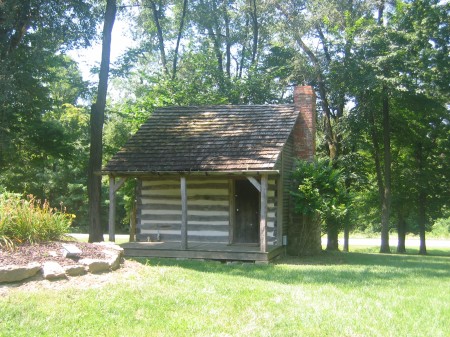
I have already written about the need for routine when it comes to writing. Equally important, for me anyway, is where I write. I know people who can dash off stuff in trains, waiting rooms, and especially in coffee shops. This always baffles me. Perhaps I’m just too nosy, or feckless, but I am unable to concentrate on what I’m supposed to be doing if there are strangers wondering about, going about their own business. There’s always something more interesting to look at or listen to. My productivity, never exactly spectacular, dwindles to the merest dribble of words if I take myself off to a public place and try and work.
Oddly, I also find it difficult to work in my office. I am the only person who works there, but I’m faced with a different set of problems. That space is where I practice law – and for some reason that seems to prevent me from doing much useful creative work there. I suspect this may be due largely to guilt. If I’m in my office, a small voice in the back of my head whispers, you should be doing proper work. (By which, of course, the small voice means work I get paid for.)
The photograph at the top of the page is of the log cabin in our yard, where I finished my fourth novel, Wonderful You, studied for the Missouri Bar Exam, and began (and abandoned) two woefully ill-conceived novels before starting on Paradise. The cabin was great while I was writing or studying full-time. It was away from the house, which was critical as we had a new-born at the time and there was an awful lot of noise. It has a certain Thoreau-like charm to it, as you can see. But beware such bucolic delights, dear reader. All manner of wildlife was keen to come and join me in there, and the extremes temperatures of Missouri summers and winters left me yearning for properly air-conditioned surroundings.
When I started my law firm and began writing exclusively in the mornings again, I gave up on the cabin. I was not interested in traipsing across the yard with coffee and computer at 5 in the morning. For several years I wrote in our spare bedroom, and that worked well enough, although I yearned for a permanent den which I could really make mine.
Earlier this year, I got my wish. Catherine had been sleeping in the small room next to our bedroom which was her nursery, but she finally became aware of the inequality of bedroom real estate between her and her brother. When she began agitating for a move to a bigger bedroom, I saw my chance. I claimed the nursery as my own, and this is where I sit as I type this.
It’s the smallest room in the house, and I absolutely love it. I can shut the door and the rest of the world retreats.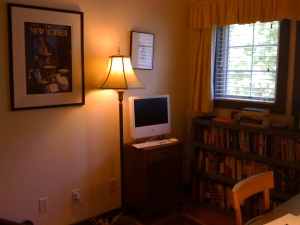 The Mac you see in the photo on the left is, I’m slightly ashamed to admit, used solely to hold my music. Christina gave me the poster on the left of the picture a couple of Christmases ago, and I love it. It’s a New Yorker cover of a jazz trio. Judging by the posture of the pianist as he plays, I’m guessing it’s meant to be Bill Evans.
The Mac you see in the photo on the left is, I’m slightly ashamed to admit, used solely to hold my music. Christina gave me the poster on the left of the picture a couple of Christmases ago, and I love it. It’s a New Yorker cover of a jazz trio. Judging by the posture of the pianist as he plays, I’m guessing it’s meant to be Bill Evans.
I derive an improbable amount of satisfaction from simply looking at my bookshelf. There is a loose system here for arranging these – jazz books, biographies, research, and so on.
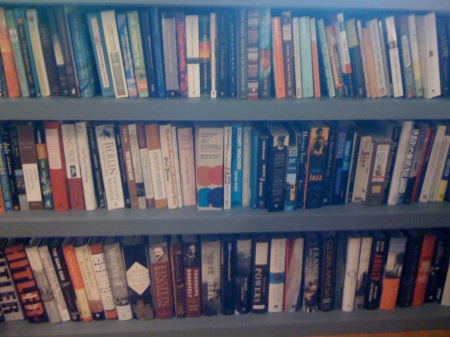
Having all this stuff so close to hand makes me very happy, although mostly I just gaze contentedly at the spines of the books. And I think that’s the point of all this. In my writing room I am cocooned in a small space jam-packed with things that give me comfort and calm me. They act as a buttress against the world outside the door, and clear a space in my head so that the words can (with a little bit of luck) come rushing in.
It’s taken me a long time to get a room of my own, and I know how lucky I am to have it. Of course, you don’t have to have a whole room- you might just have a corner of a room, half a table top, or the edge of the bed. But it shouldn’t matter. What’s important is that you find somewhere that you can exclude the outside world, and concentrate on the story you have to tell. If you can wax creative above the din of someone shouting “Latte for David,” all power to you, but it’s not for me. I need my peace and quiet.




 Posted by Alex George
Posted by Alex George 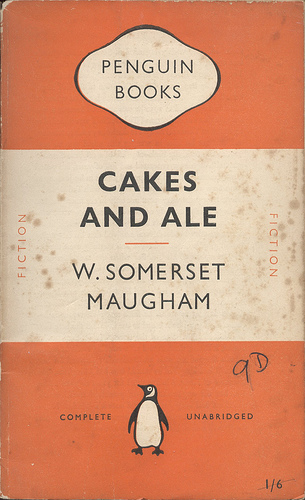
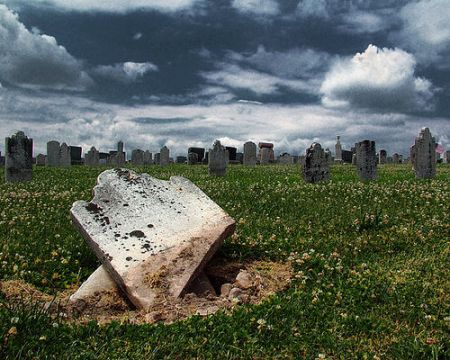

 The trick, of course, is to wear your research lightly. Your readers most likely don’t want to be lectured to, and besides, nobody likes a show-off. Obviously it helps if the material relates directly to the story you’re telling. For example, Prohibition, the 1918 influenza epidemic, the Depression and the Vietnam War (to take a few examples) are all episodes which have a material impact on the characters in Paradise, and consequently I had no choice but to delve into these in some detail. It can be difficult to achieve the right balance between the character’s story and the larger narrative. My approach has been to write all the historical stuff I think is necessary and then to pare it down remorselessly when editing, so that there’s almost nothing left. Actually, come to think of it, that’s not a bad approach to take to writing in general.
The trick, of course, is to wear your research lightly. Your readers most likely don’t want to be lectured to, and besides, nobody likes a show-off. Obviously it helps if the material relates directly to the story you’re telling. For example, Prohibition, the 1918 influenza epidemic, the Depression and the Vietnam War (to take a few examples) are all episodes which have a material impact on the characters in Paradise, and consequently I had no choice but to delve into these in some detail. It can be difficult to achieve the right balance between the character’s story and the larger narrative. My approach has been to write all the historical stuff I think is necessary and then to pare it down remorselessly when editing, so that there’s almost nothing left. Actually, come to think of it, that’s not a bad approach to take to writing in general.
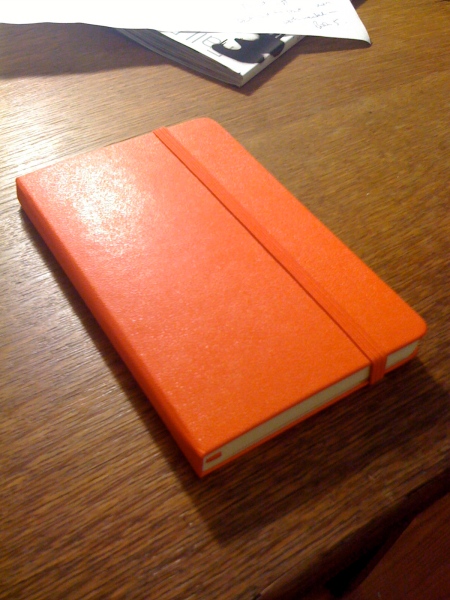

 The Mac you see in the photo on the left is, I’m slightly ashamed to admit, used solely to hold my music. Christina gave me the poster on the left of the picture a couple of Christmases ago, and I love it. It’s a New Yorker cover of a jazz trio. Judging by the posture of the pianist as he plays, I’m guessing it’s meant to be Bill Evans.
The Mac you see in the photo on the left is, I’m slightly ashamed to admit, used solely to hold my music. Christina gave me the poster on the left of the picture a couple of Christmases ago, and I love it. It’s a New Yorker cover of a jazz trio. Judging by the posture of the pianist as he plays, I’m guessing it’s meant to be Bill Evans.

